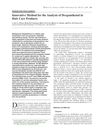 April 2022 in “JAAD International”
April 2022 in “JAAD International” Women with frontal fibrosing alopecia have similar vitamin D levels to those with other hair loss types, suggesting vitamin D is not a key factor in this condition.
10 citations,
February 2021 in “Pharmaceutics” Palmitoyl-GDPH speeds up wound healing and improves tissue regeneration without toxicity.
[object Object]  2 citations,
July 2022 in “Frontiers in Medicine”
2 citations,
July 2022 in “Frontiers in Medicine” The cause of Frontal fibrosing alopecia, a type of hair loss, is complex, likely involving immune responses and genetics, but is not fully understood.
 November 2024 in “Fermentation”
November 2024 in “Fermentation” Fermented ginsenosides from kimchi bacteria may promote hair growth better than finasteride.
 38 citations,
January 2019 in “International Journal of Women's Dermatology”
38 citations,
January 2019 in “International Journal of Women's Dermatology” The document concluded that more research is needed to find the best treatment for Frontal fibrosing alopecia.
 12 citations,
January 2003 in “Dermatology Online Journal”
12 citations,
January 2003 in “Dermatology Online Journal” A new treatment for hair loss was tested and most participants saw their hair loss stop within 2-8 weeks, with up to 50% more hair after 4 months, and no side effects.
 3 citations,
February 2023 in “ACS omega”
3 citations,
February 2023 in “ACS omega” Grape seed oil improved hair quality the most, followed by rosehip and safflower seed oils, and reduced damage from shampoo.
 2 citations,
January 2023 in “Journal of Clinical Medicine”
2 citations,
January 2023 in “Journal of Clinical Medicine” People with hair loss conditions may also have thyroid disorders, but more research is needed to understand the connection.
 1 citations,
August 2024 in “Polymers”
1 citations,
August 2024 in “Polymers” Bacterial cellulose is a promising material for biomedical uses but needs improvements in antimicrobial properties and degradation rate.
 1 citations,
May 2022 in “Pharmaceutics”
1 citations,
May 2022 in “Pharmaceutics” Tea seed oil in nanostructured carriers stimulates hair growth and feels less greasy when applied.
April 2024 in “Journal of clinical medicine” Effective treatment guidelines for frontal fibrosing alopecia are still unclear.
 July 2023 in “Research journal of pharmacy and technology”
July 2023 in “Research journal of pharmacy and technology” The hair tonic with Capsicum frutescens extract helps hair grow in male rabbits.

The study concluded that Frontal fibrosing alopecia can affect younger people, is often missed in men, and may be autoimmune-related.
 May 2023 in “Journal of Clinical Medicine”
May 2023 in “Journal of Clinical Medicine” New understanding and treatments for hair loss are improving, but more research is needed.
 October 2020 in “International Journal of Research in Dermatology”
October 2020 in “International Journal of Research in Dermatology” The review suggests more research is needed to understand Frontal fibrosing alopecia, a condition causing hairline recession in postmenopausal women.
 15 citations,
August 2022 in “Journal of endocrinological investigation”
15 citations,
August 2022 in “Journal of endocrinological investigation” Vitamin D and calcium are important for quick and effective skin wound healing.
38 citations,
March 2019 in “International Wound Journal” A new skin treatment using a patient's own cells healed chronic wounds effectively and was preferred over traditional grafts.
 January 2025 in “Diagnostics”
January 2025 in “Diagnostics” 3D high-frequency ultrasound can help diagnose skin and hair conditions without invasive biopsies.
 December 2018 in “Esperienze dermatologiche”
December 2018 in “Esperienze dermatologiche” A lotion with Centella asiatica extract reduced hair loss by 41% and increased hair strength without side effects.
 25 citations,
May 2020 in “Stem Cells Translational Medicine”
25 citations,
May 2020 in “Stem Cells Translational Medicine” ADSC-CE treatment safely increases hair density and thickness in androgenetic alopecia patients.
115 citations,
August 2014 in “Jo'jig gonghag gwa jaesaeng uihag/Tissue engineering and regenerative medicine” Human hair keratin can be used in many medical applications.
 13 citations,
August 2019 in “Journal of Ethnopharmacology”
13 citations,
August 2019 in “Journal of Ethnopharmacology” Eleven traditional Polynesian plants show potential for natural anti-aging, hair growth, and skin brightening products.
 December 2022 in “Research journal of topical and cosmetic sciences”
December 2022 in “Research journal of topical and cosmetic sciences” Herbal cosmetics with oils like olive, coconut, and almond are popular for their skin and hair benefits with few side effects.
 1 citations,
March 2019 in “Journal of AOAC INTERNATIONAL”
1 citations,
March 2019 in “Journal of AOAC INTERNATIONAL” New method quickly and accurately measures dexpanthenol in hair products.
 2 citations,
January 2019 in “Applied clinical research, clinical trials and regulatory affairs”
2 citations,
January 2019 in “Applied clinical research, clinical trials and regulatory affairs” Different countries have regulations to ensure the safety of hair care products, with some recalling hair straighteners due to high formaldehyde.
 September 2020 in “Journal of Cosmetic Science”
September 2020 in “Journal of Cosmetic Science” The caffeine content in anticellulite gels is 0.7-1.7% and in hair-care products is about 1.0%.
 December 2023 in “International Journal For Multidisciplinary Research”
December 2023 in “International Journal For Multidisciplinary Research” Indian medicinal plants can help with hair growth and common hair issues.

research Hair
1 citations,
January 2016 in “Springer briefs in molecular science” The document suggests using safer, plant-based hair products instead of harmful synthetic ones.
 November 2024 in “Journal of Natural Remedies”
November 2024 in “Journal of Natural Remedies” Herbal ingredients can effectively promote hair growth and improve hair health.
[object Object]  April 2024 in “International Research Journal Of Modernization In Engineering Technology And Science”
April 2024 in “International Research Journal Of Modernization In Engineering Technology And Science” Herbal shampoos are effective, non-toxic alternatives for treating dandruff and hair fall.

























